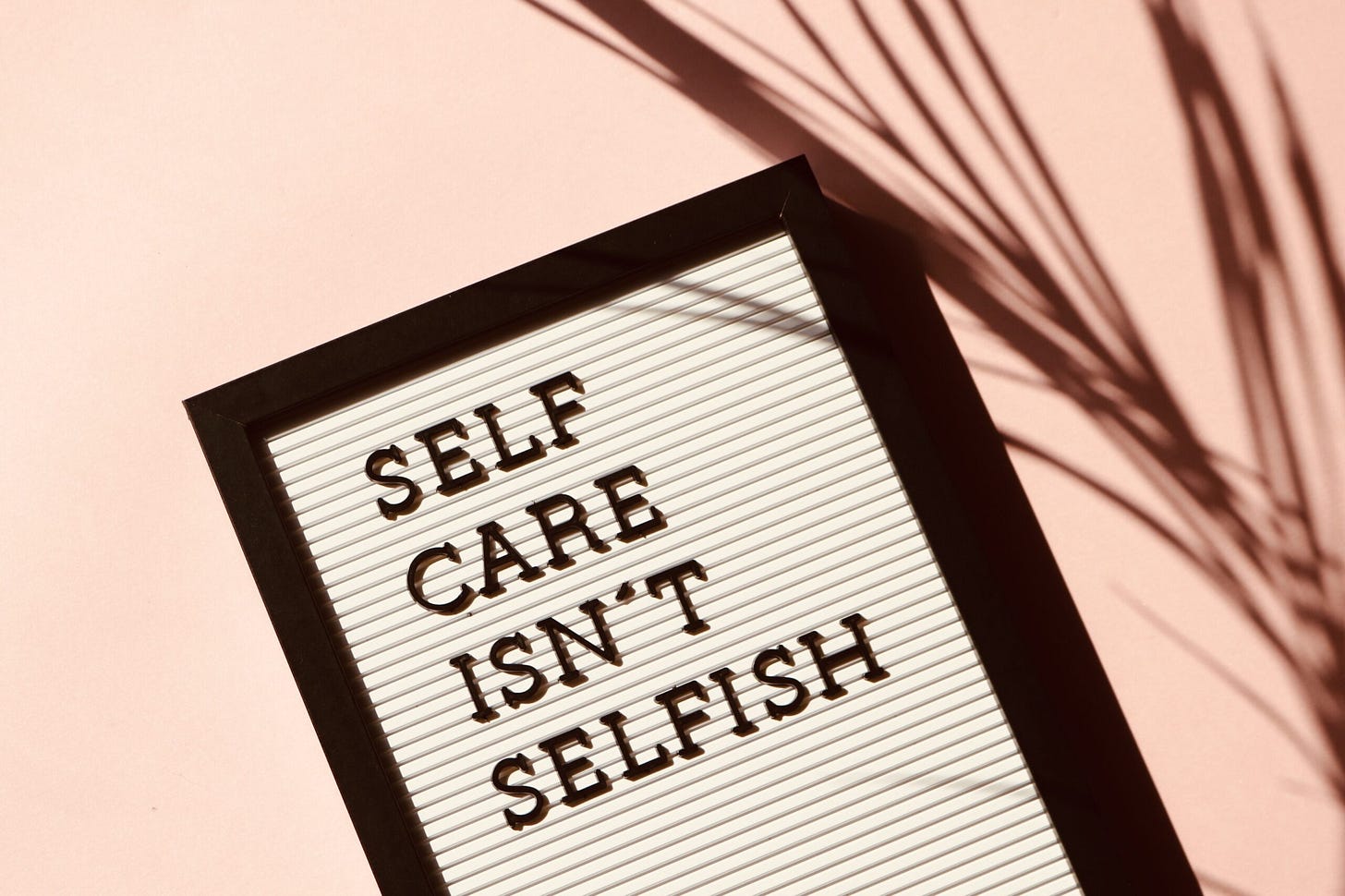When I received my first invitation to speak to an audience about self-care, my husband chortled, “Really, they are asking you to teach them about self-care?!”
I am a hypocrite in many ways! I have been a failure at self-care. But because I was so bad at it, I’ve learned a thing or two over the years. I’ve gone from a D+ student in taking care of myself to a solid B. There always remains room for improvement.
So if you think you are flunking, this “Strategies for Spiritual Self-Care” series is for you. If you need some extra tutoring, this series is for you. If you are getting straight A's in self-care then put your secrets in the comments!
The concept of self-care is everywhere right now. What started as a radical call to arms for marginalized women about self-preservation from writer and activist Audrey Lorde has gotten commodified into sheet masks, massages and bubble baths. I love a good spa day, but I worry that hashtag self-care culture sometimes becomes synonymous with self-indulgence and the two are not equal. It’s as if the “Treat Yo Self Day” metality has replaced self-care. Participating in a once-in-a-while luxury is different from caring for yourself on an ongoing basis.
Rather than trust what capitalism or Instagram might direct us to do for care, I turn to Rabbi Abraham Joshua Heschel’s teachings on the Sabbath. He spoke of Sabbath as not just one day a week— something people save up all their stressors for—but rather a perpetual mindset. It must be at the forefront of our minds at all times. It is considering your purposeful care throughout the day.
I think it is helpful to have lists of what to do and (what not to do) as cultivating daily habits is important. But I think the deeper issue is needing to explore our self-care mindsets.
The biggest barrier to self-care is often why we are not caring for ourselves, despite knowing what we need to do.
In other words, if I know what would be good for me, why am I ignoring it?
What are the stumbling blocks for self-care?
1. Thinking that you don’t need it
One pastor I worked for told me she didn’t believe in days off. She always considered herself “on” and responsive to the needs of the congregation. She claimed that was the sacrifice that ministry demanded. (This might explain why I didn’t go into church ministry!) Many of my friends in congregational work have a much healthier view of caring for themselves, but there can still be elements of denial.
Those of us who are caring for others in any form need to acknowledge the cost of that work. When I teach about self-care in the hospital setting, the quote I always use is from Dr. Rachel Naomi Remen who writes in Kitchen Table Wisdom,
The expectation that we can be immersed in suffering and loss daily and not be touched by it is as unrealistic as expecting to be able to walk through water without getting wet.
We must embrace the reality of what it is to care for other people and the immense toll it can take. This type of immersion is not sustainable in the long run if we don’t believe in caring for ourselves.

2. Thinking that some might need it, but not you
Another element of denial is thinking that the need for self-care might apply to some people, but not to you. It is another way of saying that you’re “fine.”
If we don’t care for ourselves, it makes us less effective - which can seem counterintuitive.
The airline oxygen mask metaphor is overused and often ignored. Let's try a water themed metaphor instead. As a former lifeguard, I learned that jumping in to save a drowning person isn't the first step to take. Instead, you are to assess the situation and use tools like a hook or flotation device from the pool's edge. You are supposed to stay rooted when helping; a panicked person can pull you under, and jumping in haphazardly can cause harm to you or others and obscure your view of others in need. Jumping in should always be the last resort.
(I was shocked by this and jumped in all the time and managed to hurt my ankle once. I thought that rule applied to lifeguards who weren’t as good swimmers as me. Talk about denial! I told you I’ve had to learn my lessons about self-care the hard way).

3. Thinking that it’s a privilege you can’t afford
Caring for yourself should not be a luxury, but a necessity for survival. However, it is not something everyone can make a priority. I’m writing this as a middle-aged white woman who is firmly established in my career and has job security. Many people do not have that stability.
By embracing a self-care mindset, I am not talking about days off and beach resort vacations (although I love those too). It is about recognizing that you can afford to care for yourself throughout the day and be attentive to your needs. Self-care does not need to cost money. This is where captialism’s turning self-care into an industry warps our thinking. It is free to talk lovingly to yourself, drink water, move your body and see yourself as deserving of attention.
4. Thinking that you are not worthy of it
Do you have guilt when you consider caring for yourself? Many of us believe we are required to put other’ first. Sometimes our families, religion and/or societal expectations reinforce this notion. Those in the helping professions take on Superman type personas because others expect them to do so and they’ve internalized that message. We have to unpack and process these long-held beliefs that have convinced us of unworthiness.
With some of my Christian students, I find myself quoting Jesus’ teaching on the second commandment:“You shall love your neighbor as yourself.” Usually they are fantastic at loving their neighbors. But not so fantastic at loving themselves. Some of us need to focus more on the second half of that commandment.
5. Thinking you have to prove yourself
When I was a chaplain intern, in a patient case report that I shared with my supervisor, I mentioned that I had to see this patient as they were on the consult list and it was the end of the day and I had a headache. She practically yelled at me “Why would you go see a patient when you have a headache?” That was an A-ha moment for me. It never occurred to me that I could not go see the patient.
We often put our needs second (or third or last) when we think we have something to prove. Those of us with imposter syndrome might overfunction to show our value.
6. Thinking you need permission
As a manager, sometimes my employees call me up and tell me all their symptoms of illness and ask if they should come into work or not. While I appreciate their work ethic, I put it back on them to decide. You don’t need permission to take a sick day. You don’t need a blessing from anyone but yourself to nourish your needs or tend to your wounds.
If you’re still not convinced, consider this your permission slip!
7. Thinking you don’t have time
Have you ever said to yourself, “I just have to get through this week/event and then I’ll have time for self-care?” We often think we can delay our need for self-care, but that’s not how it works. We need a perpetual self-care mindset when we are most stressed. We need to be proactive about caring for ourselves. Another dynamic I hear is people say is “I’m going on vacation in a few weeks, that’s my self-care.” Vacation is awesome1 but it is not a substitute for a daily self-care mindset. We need moments throughout our day, not just a once or twice a year getaway.
In summary:
The need for self-care is real and serious.
You are worthy of care.
Your nourishment is essential.
You will not be as effective at caring for others if you don’t care for yourself.
You’re not supposed to hastily jump in, you’re supposed to stay rooted.
What stumbling blocks get in your way?
What might you need to tell yourself right now to care for yourself more effectively?
Read another post in the Strategies for Spiritual Self-Care Series
Double the Joy
I frequently get asked how I do this work, as it can be hard to witness suffering day in and day out. There is great beauty and privilege in getting to journey alongside people, so that is what keeps me engaged in doing it. But I have also learned a lot about self-care over the years. I will be giving you some
Speaking of vacation, I’ll be on a few this summer and will likely change to publishing these articles every other week as a result.









I love this post, Christine. The self-care conversation has grown old and tired on the surface, but as you may know, I also recently wrote about it, and I think your writing here also gets at that deeper layer of really helping us to understand that the mindset and "soul-set" around self care is the conversation we need to be in now. Am I worthy of self-care? Am I deserving of putting myself before others? So many interesting somatic responses come up for me around those as a helping professional. So good!
This is so wonderful and so needed. Thank you for this, Christine. I am so guilty of pushing back on every single one of those steps you pointed out. Therapy, a mindfulness practice, and adherence to a discipline of self-care have really saved my mental health. I use to apologize for taking time for my self-care now it is who I am--no apologies needed. My wife, a wonderfully giving therapist for over 30 years, is almost pushing back on the idea of self-care but is now coming to terms with it. This is such an essential need for caregivers and I'm so happy that you're promoting its importance. Thanks again, Christine.